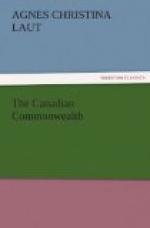Canadians acknowledge they have delegated power to make law to men whom they believe superior to the general run. Therefore, they obey that law as above change by the individual. In other words, Canadians believe in the rule of the many delegated to the superior few. Those few do what they deem wise; not what the electorate tell them. They exceed instructions. They lead. They do not obey. But if they fail, they are thrown to the dogs without mercy, whether the tenure of office be complete or incomplete. It is the old Saxon idea of the Witenagemot—the council of a few wise men ruling the clan.
There is the fountain spring of Canadian loyalty to the monarchical idea. It is not the fat king. It is not any king. It is what the insignificant personality called “king” stands for, like the five-dollar bill worthless as wrapping paper but of value as a promise to deliver the goods.
CHAPTER IV
AMERICANIZATION
I
“The Americanizing of Canada” is a phrase which has been much in vogue with a section of the British press ever since the attempt to establish reciprocity between the United States and the Dominion. It is a question if the glib users of the phrase have the faintest idea what they mean by it. It is a catchword. It sounds ominously deep as the owl’s wise but meaningless “too-whoo.” English publicists who have never been nearer Canada than a Dominion postage stamp wisely warn Canada against the siren seductions of Columbia’s republicanism.
If the phrase means that reciprocity might lead to annexation, Canada’s repudiation of reciprocity is sufficient disproof of the imputation. If it means increased and increasing trade weaving a warp and woof of international commerce—then—yes—there is an “Americanizing of Canada” as there is a Canadianizing of the United States through international traffic; but the users of the phrase should remember that the country doing the largest trade of all countries with the United States is Great Britain; and does one speak of the “Americanizing” of Great Britain? If it means that in ten years two-fifths as many Americans have settled in Western Canada as there are native-born Canadians in the West—then—yes—Canada pleads guilty. She has spent money like water and is spending it yet to attract these American settlers; and they, on their part, have brought with them an average of fifteen hundred dollars a settler, not counting money invested by capitalists. If in the era between 1900 and 1911, 650,719 American settlers came to Western Canada, and from 1911 to 1914, six hundred thousand more—or say, with natural increase, a million and a quarter in fifteen years; to counterpoise that consideration remember that in the era from 1885 to 1895 one-fifth of Canada’s native population moved to the United States.




